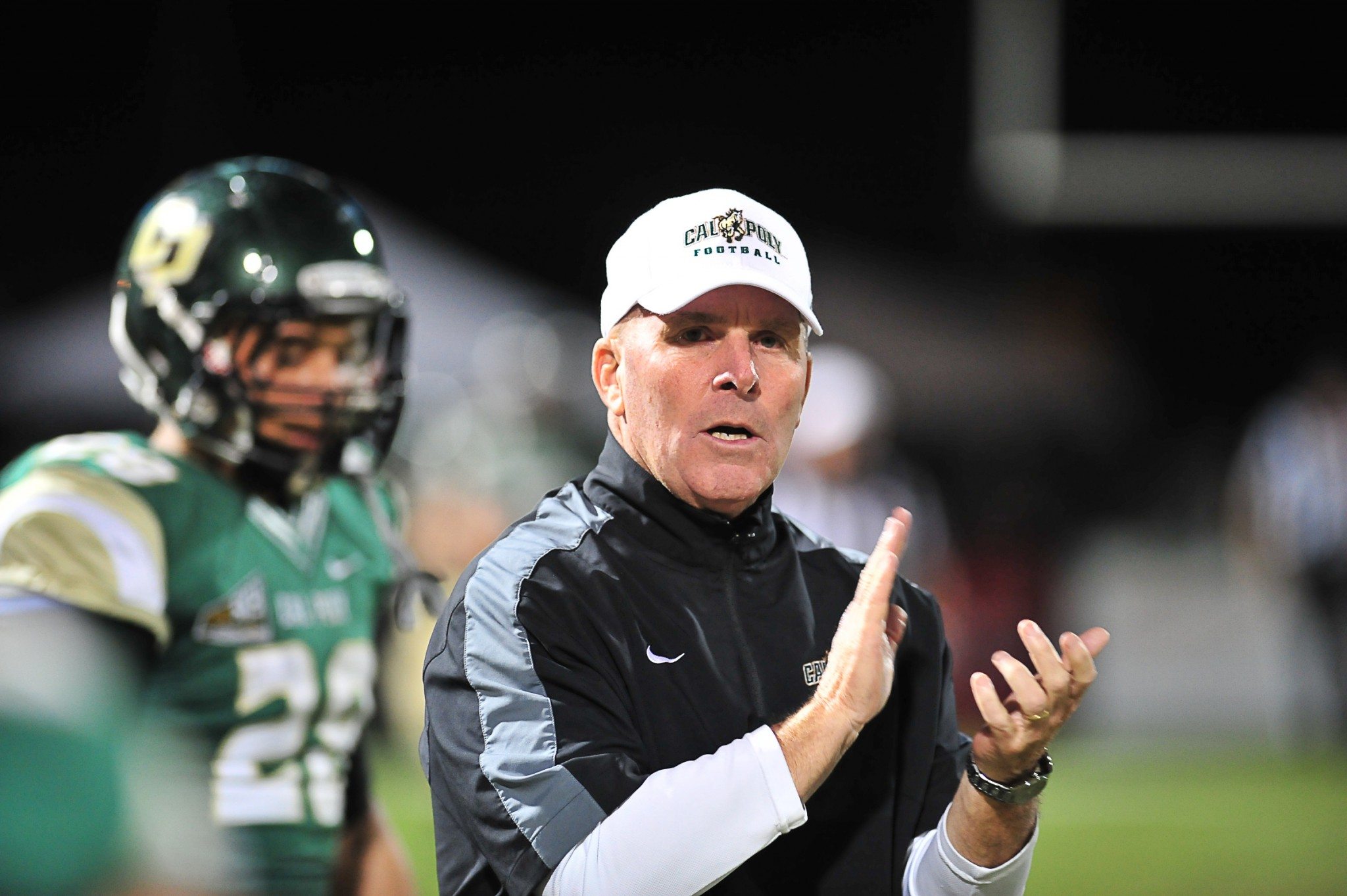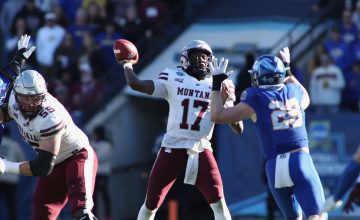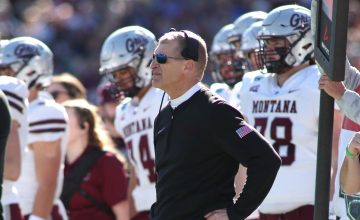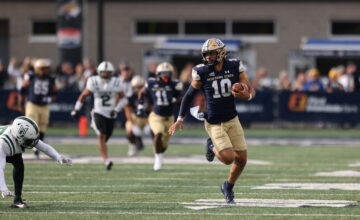Tim Walsh’s football life was reinvigorated by the triple option. To learn it, he had to leave his longtime home, a place he built into a Big Sky Conference contender. And when his risk didn’t work out, learning, teaching and installing the triple option as the offensive coordinator on Stan Brock’s staff at the United States Military Academy rather quickly led Walsh back to the West Coast.
During 14 seasons at Portland State, Walsh helped the Vikings transition from perennial Division II power into Big Sky contender. Between 1999 and 2006, PSU finished second in the league standings four times and in the top four every season but one. But when Brock, a former first-round draft pick and 16-year NFL veteran offensive lineman from Portland, offered Walsh an opportunity to coach some of the nation’s finest young men, the chance proved to be too much to pass up.
After a 3-9 record in 2007 at West Point, Walsh took to installing the triple option to replace the pro set previously used. The idea was to offset talent deficiencies, a similar strategy employed at the Naval Academy and the Air Force Academy. The triple option was a stark contrast from his Portland State days where bruising tailbacks in the West Coast offense and stern defenses helped Walsh and his staff win 30 Big Sky games over their final eight seasons.
In their second season at Army, the Black Knights went 3-9 again. The offense ranked 110th out of 119 FBS teams. The season ended with a 34-0 loss to Navy in the Civil War. On December 8 of 2008, the staff was fired.
Army elected to build on the momentum of the offensive installation and continue to mirror the other academies. The school hired Rich Ellerson, the man who built Cal Poly into an FCS power first as an independent and then into a three-time Great West champion. Ellerson’s triple-option offense and “Flex” defense were big selling points. The move also left an opening in San Luis Obispo.
With experience, a newfound affinity and fascination with the triple option, Walsh jumped at the job. In 2009, he was hired as Cal Poly’s head coach.
“I would’ve never left except for where I ended up, which is a good thing,” Walsh said. “We were promised a lot of things when we went to West Point. We had five years to fix it and all those great things. We didn’t get five years to fix it. I think we were on the right path when we put the triple option in our second year. But if I would’ve known I only had two years, I would’ve stayed in Portland. Portland is a great place and I think you can win at Portland State.
“A big piece of me, 14 years of my life is there.”
Now that Walsh is at Cal Poly, he has no regrets. When Walsh first took the Cal Poly job, he had no intention to come back to the Big Sky, a conference in which he won 42 games in 11 seasons. In Walsh’s second season in SLO in 2009, the Mustangs won seven games. In 2011, they won the Great West. In 2012, the Great West essentially joined the Big Sky and the Mustangs shared a piece of the league title and advanced to the FCS playoffs, losing to eventual national runner-up Sam Houston State 18-16 in the first round.
Some of the recruiting challenges related to academics that Walsh faced at Army exist at Cal Poly. The qualifying standards for basic admittance are far higher than NCAA general standards. The option has been successful at Cal Poly since the turn of the 21st century so Walsh has continued to recruit academically oriented kids who can fit into the intricate offense successfully.
“I like the option because it has really concrete answers and they ran it here before I got here,” Walsh said. “I became a good fit for this place after spending time in West Point. From an offensive philosophy, it’s the right philosophy to run here too because we face many of the same challenges as West Point.”
Walsh says getting into school at Cal Poly is “almost impossible, even for athletes.” His recruits are required to carry 3.0 high school grade-point averages, an 1,100 on the two-part SAT, 23 on the ACT just to qualify for a liberal arts major. To get into other majors, “it’s much more structured and difficult.”
At Cal Poly, Walsh’s teams have thrived with smart decision makers at quarterback like Andre Broadus and current senior captain Chris Brown. They’ve had standout ball carriers like Deonte Williams, Kristaan Ivory and Brandon Howe, along with the current duo of sophomore Joe Protheroe at H-back and Kori Garcia at the wing back. For much of the duration, although this season is different, the offensive line has been filled with undersized, smart players. This season, the offensive line averages 6-foot-4.5 and 282 pounds but Miles Williams started at left tackle for Cal Poly at 235 pounds last season.
Although the offensive scheme is different, Walsh has been able to instill the toughness that defined his teams in Portland to his troops in San Luis Obispo. Cal Poly has suffered injuries to key players and breakdowns physically overall the last two seasons to miss the playoffs and stay out of the title race. But the Mustangs have been among the hardest hitting, fastest moving and most aggressive matchups in the league since joining the Big Sky.
“They are my favorite to win the league because they are so hard to play against, they are so well coached and Tim Walsh does such a great job,” said Idaho State Mike Kramer, the coach who awarded his first place vote to Cal Poly in the preseason coaches’ poll. “They are resilient. They can hit. They are out of the groove, dynamic. They are mindful of what their opportunity is and they have good tradition. Pound for pound, man for man, they are the toughest team in the league.”
At Cal Poly, Walsh’s offensive stars have had defensive counterparts. Defensive tackle Sullivan Grosz shared the Big Sky Defensive MVP with Buck Buchanan winning Montana State defensive end Brad Daly in 2012. Linebackers Kennith Jackson, Johnny Millard, Nick Dzubnar and Cameron Ontko turned all-league careers into professional opportunities. It’s an attitude to remember greatness and try to pursue it that the 61-year-old Walsh intentionally instills.
“This is the type of guy where you put your work in and you prove yourself,” Cal Poly senior linebacker Burton De Koning said. “He’s a no B.S. type of guy. You earn it, you’ve got it. You have to earn it each everyday. He preaches that you can’t just come out here and be lackadaisical, slack off. Every day, we have to prove ourselves on the field. He takes care of us, looks out for us and he has our back. I’m happy to be playing underneath him.”
“I love Coach Walsh’s coaching style,” added junior safety B.J. Nard, the FCS leader in interceptions with three. “It’s like no other coaching style I’ve seen. Very passionate. You can see it on fourth down when he says we are going to punch it. He’s going to go for it. He keeps is real 100 percent. He’s definitely a players’ coach. All our players love him. We are going to go in the battle and we will always put up a fight for him no doubt.”
During the PSU days, the Vikings threw the ball significantly more often in the West Coast attack as players like quarterbacks Jimmy Blanchard and Wood, running backs like Charles Dunn and Ryan Fuqua, receivers like Terry Charles and Orshawante Bryant all thrived. In Walsh’s West Coast attack, Blanchard was first-team All-Big Sky in leading PSU to its first and still only playoff appearance in 2000. Dunn was a four-time All-Big Sky pick, earning first-team honors for three straight seasons and league MVP honors as a senior in 2000. Running behind an always-strong offensive line, Dunn finished his career with 6,007 yards, second-most in league history, and 54 touchdowns. Fuqua piled up 4,730 yards, 41 touchdowns and two straight All-Big Sky honors as he finished fifth all-time in league history in rushing yards. Bryant and Charles combined for two first-team all-conference and a second-team all-conference selection each between 1998 and 2001.
During the last three seasons in the City of Roses for Walsh, the Vikings won seven games twice and did it mostly with defense. Players like Joey King, Dominic Dixon and 2006 Big Sky Defensive MVP Adam Hayward led the way.
In his five seasons away from the Big Sky between 2007 and 2012, Montana dominated the first portion. The Grizzlies won three straight outright Big Sky crowns, posted a 31-1 record in league play and advanced to two national title games between 2006 and 2009. Since the turn of the decade, the league has seen the playing field begin level out. Cal Poly shared the league title in 2012 with Eastern Washington and Montana State, the teams that shared the title in 2010. The Bobcats were the outright champs in 2011. Over the last three seasons, Eastern has won or shared the league title, running the table in 2013 and winning the title outright last season.
Cal Poly and three other former Great West teams — North Dakota, Southern Utah, UC Davis — joined the league in 2012 and have further diversified the geographic, academic and philosophical landscapes of the league. Recruiting has changed and broadened, the brand has seen a significant spotlight because of cable television, the schools have steadily improved their facilities and the administrations almost overwhelmingly see the benefit of athletics, Walsh said.
“From 1998 to 2006, we always felt comfortable we would be in the top four going into it,” Walsh said. “Right now, I don’t feel comfortable that any one can say that. Maybe Eastern can. Maybe Montana State can. But the rest of us, we have to claw and scratch.”
Walsh’s Cal Poly staff features three former Portland State All-Big Sky players: offensive coordinator Saga Tuitele (first-team All-Big Sky offensive lineman as a senior in 2002), quarterbacks coach Juston Wood (first-team All-Big Sky quarterback in 2001) and wide receivers coach Jim Craft (PSU senior in 1998). They haven’t forgotten about the old days.
But the triple option has produced 17 Big Sky wins in 24 outings in the last three seasons as Cal Poly enters its opener against Montana State in Bozeman on Saturday. The Mustangs enter the game 1-2 but for hardly any fault of an offense that rushed for a Big Sky record 4,221 yards last fall. This season, Cal Poly is churning out 321 yards per game after facing off against two of the FCS’ fiercest defenses in Montana and Northern Iowa along with the likes of Pac 12 South preseason favorite Arizona State. If his staff were ever to say anything about throwing the football more, Walsh reminds them that the triple option is the reason they are in San Luis Obispo in the first place.
“I do know that our coaches do think about the way we played in Portland,” Walsh said. “Some of them played for me and I have to tell them to get their minds out of the gutter. We don’t play that game anymore. We play the old style of football of rough and tough and run it 75 or 80 percent of the time.”
Cal Poly has run the ball 213 times in 255 offensive plays thus far, or 85 percent of the time. The Mustangs are averaging 71 rushes per game. It’s exactly how Walsh wants it.
“This has probably rejuvenated my football life along with a lot of our coaches that coached for me in Portland and played for me.
“For me, I think we will be doing this until the day I’m done. And I feel good about it and I enjoy it. Would we like to throw it more? At some point in time, we are going to get big enough and strong enough on the offensive line where we think we can protect long enough where we think we can do some things that we used to do in the pass game and that will even make us a little more potent. But for now, we are sticking with this.”
Photos courtesy of Cal Poly Athletics unless otherwise noted. All Rights Reserved.



















